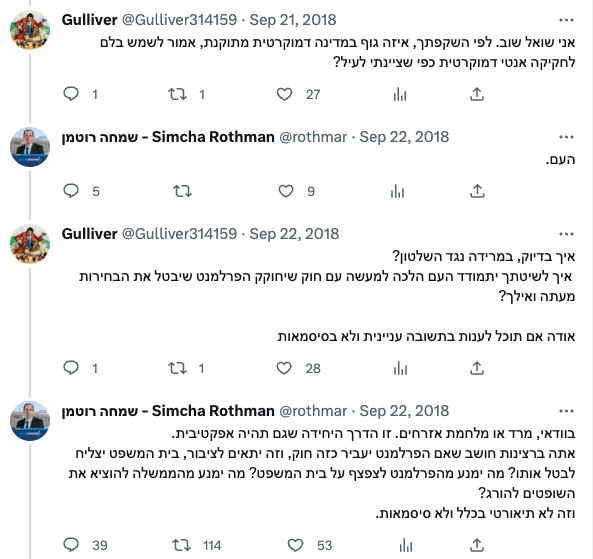In usual times, we send out a written column on Mondays, and a podcast for paid subscribers on Wednesdays. But these are not usual times. We will continue on Monday with the regularly-scheduled column and the podcast on Wednesday, but in the meantime, a few glimmers of what’s getting talked about here, that doesn’t come through in the mainstream English press.
First, the mood of the protests
On Tuesday, on the day of massive protests throughout the country, there was a protest/march in Jerusalem. It was much smaller than Tel Aviv’s (which some say numbered 200,000), but still, there were many thousand there. There were protesters of all ages, religious and secular (including a scattered Haredi person here and there), lots of Hebrew University students.
The clip at the very top of this page is a lovely moment at the end of the protest. The next clip, immediately below, will give you a sense of the vibe. Listen carefully, and you can hear the word “Demokratia.” What that means is obvious.
But there were also more ominous moments. The following video is from fifteen minutes later. The “parade” atmosphere has given way to something very different.
Who set off the smoke canister here? And to make what point?
And listen to the chant. There’s no “Demokratia” in this one. You’ll hear the words napil et ha-shilton, nafaltem al ha-dor ha-lo-nachon: “We’re going to bring this government down; you went after the wrong generation.”
For many, the rubicon has been crossed. Even stopping the legislative train might not be enough.
Bringing down the government is not in the least why I’m at the protests. Quite the contrary. But there are thousands of people who want blood—and as I’ll explain in greater detail in Monday’s regularly scheduled column, it no longer has anything to do with judicial reform.
Second, what if the protests don’t work? What options will the protesters feel they have?
Like everyone else here, I’ve been charting for myself the various ways in which this could unfold over the next ten days, when the second and third readings of the “reasonability clause” reform will come up for a vote in the Knesset. The Knesset goes on recess after that, so the next ten days are “do or die” for both sides.
Will the Histadrut, the largest labor union in the country (and it is huge, representing about 800,000 workers in a country in which about 4.3M people are employed … in other words, it’s about 20% of the work force) strike as it has said it will?
The Histadrut alone can bring the country to a screeching halt. Will they do it? For how long?
Doctors have announced that if the legislation proceeds, they are going to strike. Will they do it? And again, for how long? How many surgeries will be delayed? How many people will die because of screwups? I’m not taking a stand on their strike—I’m just wondering whether it would tip the scales. Would doctors plus the Histadrut tip the scales?
And what if none of this works? Try this thought experiment:
Imagine you’re one of those students, and you are convinced that the legislative changes would turn Israel into a non-democracy, that unless you leave, your kids will grow up in a country that more resembles Turkey than present day Israel. What would you do? (You wouldn’t be alone; Avichai Mandelblit, the former Attorney General, said this week that Israel is “on the verge of becoming a dictatorship.”) Would you say to your children and grandchildren, “well, we tried to stop it, but we obviously weren’t going to break the law or use violence, so we lost the country. But we tried.”?
Is that what you would want to have to say? Or would you make a different decision?
I had the beginnings of that conversation with a leading Israeli public intellectual, well known, most definitely not seen as a person of the left. In response to something he then sent me, I wrote back saying that I think that we’re not far way from some protesters, feeling that the country is slipping between their fingers, deciding that the law-abiding protests are getting them nowhere, and that they might change their tactics.
He disagreed. Here’s the exchange that followed. (For those not familiar with WhatsApp, I’m in the green, he’s in the white. Bagatz, by the way, means “Supreme Court.”)
Wow. That was not where I thought that conversation was going. A guy who has served the country and defended it internationally for years, saying that it “will be the time to seriously consider leaving”? Or “I’m not convinced this is the country I’ll die in”?
You just can’t pick up these vibes from afar. Nothing in the mainstream press can convey this. Things here are getting desperate. The forest is bone dry, and everywhere you turn, people are dropping matches.
Third, how much rage lurks among the people leading the judicial reform?
The following Twitter exchange is authentic, still online at https://twitter.com/rothmar/status/1042663346049376258 (though people here taking screen shots left and right in case that changes). For the record, I have no idea who “Gulliver” is, but here’s a translation of the exchange between him and Simcha Rothman (now Chair of the Knesset’s Committee on Constitution, Law and Justice), one of the two people pushing the judicial reform. Read to the end—he actually speaks about executing the justices of the Supreme Court.
Gulliver: I’m asking again. In your worldview, which body, in a functioning democratic state, should be the brakes against anti-democratic legislation?
Rothman: The people.
Gulliver: How, exactly? With a revolution against the government? How, in your mind, could the people actually respond to a law that the parliament would pass that annulled elections from here on? I’d appreciate it if you could answer meaningfully, and not just with slogans.
Rothman: Absolutely: a rebellion or civil war. That’s the only way that would work. Do you really think that if the parliament passed a law like that, and the people were fine with it, that the court would succeed in overturning it? What would prevent the people from just ignoring the Supreme Court? What would stop the government from executing the justices? That’s not theoretical, and it’s not slogans.
When this exchange took place in 2018, Rothman had no power. Bibi was Prime Minister, but he didn’t give a hoot about Rothman. So Rothman was fine speaking about the legitimacy of rebellion, of civil war and even the possibility of executing the justices of the Supreme Court.
It makes his objection to civil disobedience these days just a bit more difficult to take seriously. It makes his proclamations that the protesters are “anarchists” hypocritical in the extreme.
Fourth, the abomination of Diaspora leaders meeting with Bibi.
This is the eleventh hour, and the stakes could not be higher. So it’s time to stop pretending. Let’s just say what we think, and let the chips fall where they may.
It’s summertime, so tourists are flooding the country. That’s great. So, too, are delegations upon delegations landing here. Also great.
Some of the most prominent ones are meeting with the Prime Minster.
But that is not great. That is an abomination.
No, this is not entirely Netanyahu’s fault. No, Bibi doesn’t even care about the judicial reform that much (in the past, he’s spoken clearly about the need for a powerful, independent Supreme Court, but he wasn’t in political hot water then). And yes, there is room for judicial reform, that’s clear.
Yet after all the “buts,” and all the legitimate countervailing arguments, here is what is undeniable: This country is racing towards an abyss from which there might be no return. We’re not there yet, and we may not get there—I pray we don’t. But at this moment, the train is out of control, careening down a steep mountain without brakes. Unless something gives, this is going to end horribly. There’s still time to save it, but not much.
There is only one person in this country who can stop this. He could tell his coalition that it’s time to renew the negotiations at the President’s residence, to save the country. Even better, he could tell his coalition that he’s adopting the proposal for a Constituent Assembly that would essentially be Israel’s long-overdue Constitutional Convention (it’s hard to assess how much traction the idea is getting). He could tell his coalition to soften the legislation and to come back with something that would win over a good part of the opposition. He could try to make a deal with Gantz and Lapid (not sure they would do it, but it’s impossible to imagine that the idea isn’t being batted around) to form a unity government, and dump the right flank of his coalition.
He could and should do one of these things, or something else—not necessarily because he’s wrong, or at fault—reasonable minds can differ on that. He should do it if he cares at all about the future of the State of Israel. He should do it because if he doesn’t, we could crash and burn.
But so far, he is playing a horrifying game of chicken to which we are all hostage.
That is why the meetings with him are an abomination. Given what he is doing, to meet with Netanyahu in this season is a betrayal of the Jewish state and the Jewish people. A friend of mine said to me this week, “he’s Shabbatai Zvi,” a reference to the false messiah who had won over thousands, and when he was proven a fraud, caused many to take their own lives. Not the analogy I would have thought of, but it gave me pause.
Another friend of mine, an important American Jewish leader (there is simply no one who doesn’t live here more devoted to the Jewish state than he is) posted a picture of his group meeting with Bibi. I replied that I thought it was outrageous that they did that. He replied that “if you’re not at the table, you don’t have a voice.”
Come on. Who really thinks American Jews have a voice with Bibi? He’s said many times (off the record, but it’s been oft repeated by many, including Ron Dermer) that he doesn’t need American Jews, because he has the Evangelicals. American Jews, Bibi says, will give him a hard time no matter what he does, and the Evangelicals will support him, also no matter what he does. It’s not true, and it’s an attitude that’s terrible for the Jewish people, but it’s what he thinks.
And these people meeting with him imagine that they really have a voice? That Bibi cares in the least what they think? He doesn’t. He couldn’t care less what they say or what they think. They want the photos for their grandchildren, and he wants them to prove that in the end, lots of Diaspora Jewish leaders will genuflect no matter what he does.
That groveling won’t change the outcome of this in any way, in one direction or the other. But that doesn’t make it any less shameful. It doesn’t matter, of course, what my friends or I think about these groups meeting with him—it’s history that will judge them, and it will judge them clearly.
When it’s time for an accounting, with God, with history or with whatever people believe in, one thing will be crystal clear: it will be obvious that they planted themselves squarely on precisely the wrong side of the Jewish people’s history.
Impossible Takes Longer is now available on Amazon and Barnes & Noble and at other booksellers.
Our Twitter feed is here; feel free to join there, too.
Our Threads feed is danielgordis. We’ll start to use it more shortly.








